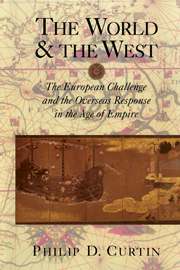Book contents
- Frontmatter
- Contents
- Preface
- Part One Conquest
- Part Two Culture Change and Imperial Rule
- Part Three Conversion
- Part Four Independence and the Liquidation of Empires
- 11 Non-European Resistance and the European Withdrawal
- 12 Personal and Utopian Responses
- 13 The Search for Viable Independence: Indonesia
- 14 Paths to Viable Independence: Ghana
- Afterword
- Index
13 - The Search for Viable Independence: Indonesia
Published online by Cambridge University Press: 05 June 2012
- Frontmatter
- Contents
- Preface
- Part One Conquest
- Part Two Culture Change and Imperial Rule
- Part Three Conversion
- Part Four Independence and the Liquidation of Empires
- 11 Non-European Resistance and the European Withdrawal
- 12 Personal and Utopian Responses
- 13 The Search for Viable Independence: Indonesia
- 14 Paths to Viable Independence: Ghana
- Afterword
- Index
Summary
At the end of the twentieth century, virtually all of the former colonial world has achieved the new status of recognized independence and membership in the United Nations. The paths to independence have varied, and the outcome now seems inevitable, but the nature of the independent unit was unpredictable in the beginning. Some countries became independent with nearly their precolonial boundaries as in the case of Morocco. Some became independent within the frontiers created by the colonial rulers – the next chapter deals with the example of Ghana. Still others seemed destined for independence in that form, and then broke apart, as British India broke into India, Pakistan, and Bangladesh. Some imperial federations subdivided almost without question, as French West Africa did; others remained as a unit, as Nigeria did, but only after a sharp civil war to decide the issue.
This chapter and the one that follows deal with ways in which two of these newly created nations sought, and succeeded in some measure, not merely to become independent but to do so as recognized nation-states with a measure of equality with others in the postcolonial international order. Indonesia and Ghana are very different places, almost a world apart, and their very viability is still in some respects in question. They illustrate, nevertheless, some of the ways in which the interaction of European rulers and local people over a relatively brief period succeeded in creating a new political society.
- Type
- Chapter
- Information
- The World and the WestThe European Challenge and the Overseas Response in the Age of Empire, pp. 232 - 252Publisher: Cambridge University PressPrint publication year: 2000



